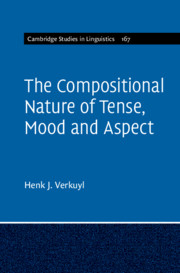Book contents
- Frontmatter
- Dedication
- Contents
- List of Figures
- List of Tables
- Preface
- 1 Introductory Chapter
- 2 How to Deal with the Long Tradition of Going Ternary?
- 3 Binary Tense Structure
- 4 Naive Physics and Aspectual Composition
- 5 Levels of Interaction between Aspect and Tense
- 6 Binary Tense Structure and Adverbial Modification
- 7 How to Deal Binarily with ...?
- 8 Tense, Mood and Aspect
- Appendix
- Bibliography
- Author Index
- Subject Index
7 - How to Deal Binarily with ...?
Published online by Cambridge University Press: 08 October 2021
- Frontmatter
- Dedication
- Contents
- List of Figures
- List of Tables
- Preface
- 1 Introductory Chapter
- 2 How to Deal with the Long Tradition of Going Ternary?
- 3 Binary Tense Structure
- 4 Naive Physics and Aspectual Composition
- 5 Levels of Interaction between Aspect and Tense
- 6 Binary Tense Structure and Adverbial Modification
- 7 How to Deal Binarily with ...?
- 8 Tense, Mood and Aspect
- Appendix
- Bibliography
- Author Index
- Subject Index
Summary
Chapter 7 presents a theory of the Progressive Form in which the PROG-operator is broken up into BE and -ING. This makes it impossible to maintain the central position attributed to the Progressive in the analysis of imperfectivity. The situation turns out to be more complex but can be accounted for compositionally by giving -ing its own semantic value. The chapter also shows how the binary approach to compositionality bridges the gap between the analysis of Slavic and non-Slavic aspect. It formalizes an aspectual theory which accounts for a wide variety of Slavic languages. It continues by focussing on the position of the aorist in rich tense systems where it has to survive marginally or where it has obtained an important position. A comparison is made with aoristic tense forms in systems that are (re-)organized binarily such as French. That opens the way for a deeper insight in the semantics of tense forms in languages where the aorist does not or no longer appears.
Keywords
- Type
- Chapter
- Information
- The Compositional Nature of Tense, Mood and Aspect , pp. 211 - 252Publisher: Cambridge University PressPrint publication year: 2021

